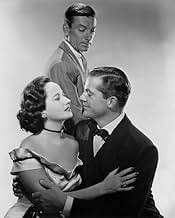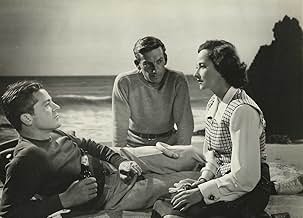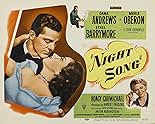IMDb RATING
6.4/10
720
YOUR RATING
When a beautiful socialite falls in love with an embittered composer who is blind, she feigns blindness herself in order to get closer to him.When a beautiful socialite falls in love with an embittered composer who is blind, she feigns blindness herself in order to get closer to him.When a beautiful socialite falls in love with an embittered composer who is blind, she feigns blindness herself in order to get closer to him.
- Awards
- 4 wins total
Whit Bissell
- Party Guest
- (uncredited)
Leonard Bremen
- Chez Mamie Headwaiter
- (uncredited)
Charles Cirillo
- Sailor at Chez Mamie
- (uncredited)
Angela Clarke
- Woman
- (uncredited)
George Cooper
- Bellboy
- (uncredited)
Lynn Craft
- Party Guest
- (uncredited)
Suzi Crandall
- Fur-Coated Pedestrian
- (uncredited)
Herbert Evans
- Butler
- (uncredited)
Featured reviews
For those who did not live in the 40s, this film may appear to be soap-operish. However, one must remember that 60 years of Real and TV soap opera have drastically diminished its impact, leaving us with a feeling that we have seen it all before - forgetting that it was the "first". A blind musician, a wealthy socialite, an "all-knowing" aunt, a musical friend, Rubinstein and Ormandy - what a confection! And the "glue" that holds it all together is the music. After all, it IS "Night Song". Other reviewers have been rather harsh in their criticism of Leith Stevens' concerto. It should be noted that it has been recorded along with other film piano concertos on ELAN CD (Piano in Hollywood)and represents - along with the output of so many others - the greatest "American" symphonic music of the 20th century. Film music never gets its proper due. Whatever "romanticism" in this movie appears far fetched, it's no less plausible than the current crop of "action" films. For those who prefer clanging and banging, this "song" is not for you!
NIGHT SONG might only appear to be a routine example of the kind of postwar romance that most of the major studios produced. A blind bar pianist (Dana Andrews) is taken up by a wealthy socialite (Merle Oberon), who pretends to be blind herself in order to secure his confidence. After a courtship in San Francisco, the pianist is given sufficient financial backing to have an operation to restore his sight, and receive a concert premiere of his new concerto at Carnegie Hall, New York. He returns to San Francisco, where he meets his beloved, and the two them vow eternal love.
Frank Renton and Dick Irving Hyland's screenplay contains its fair share of intertexts. The idea of a concert performance dates back to Brian Desmond Hurst's huge British wartime hit DANGEROUS MOONLIGHT (1941), that contained the premiere of Addinsell's "Warsaw Concerto," while Andrews's predicament as a war-scarred survivor cross- references Goldwyn's THE BEST YEARS OF OUR LIVES (1946), in which the actor had given an equally memorable characterization in a similar role.
Yet nonetheless NIGHT SONG possesses a certain integrity. Director John Cromwell establishes a close bond between Andrews and his boon companion Chick (Hoagy Carmichael, who even gets a solo number), and by doing so suggests the importance of male bonding in an often uncertain world. No one, it seems, knows really what to do with the peace, after having won the war; the only outlet both men can find is playing bands in some cheap SF dive bars.
This relationship is contrasted with the more spiky friendship between Oberon and her boon companion Miss Willey (Ethel Barrymore). The grande dame of the American theater gives one of her more commanding characterizations as a supposed cynic with a heart of gold, who readily understands the agonies her younger friend experiences as she tries to woo the pianist without hurting his feelings. In an environment where people seldom gave vent to their emotions in public, emotional expression is put at a premium.
The end of the movie is enlivened by a live performance from Leopold Stokowski and Eugeme Ormandy playing themselves with the New York Philharmonic Orchestra. They do not have to do much, but they set about delivering the concerto (with music by Leith Stevens) with a conviction and gusto that is truly refreshing.
Frank Renton and Dick Irving Hyland's screenplay contains its fair share of intertexts. The idea of a concert performance dates back to Brian Desmond Hurst's huge British wartime hit DANGEROUS MOONLIGHT (1941), that contained the premiere of Addinsell's "Warsaw Concerto," while Andrews's predicament as a war-scarred survivor cross- references Goldwyn's THE BEST YEARS OF OUR LIVES (1946), in which the actor had given an equally memorable characterization in a similar role.
Yet nonetheless NIGHT SONG possesses a certain integrity. Director John Cromwell establishes a close bond between Andrews and his boon companion Chick (Hoagy Carmichael, who even gets a solo number), and by doing so suggests the importance of male bonding in an often uncertain world. No one, it seems, knows really what to do with the peace, after having won the war; the only outlet both men can find is playing bands in some cheap SF dive bars.
This relationship is contrasted with the more spiky friendship between Oberon and her boon companion Miss Willey (Ethel Barrymore). The grande dame of the American theater gives one of her more commanding characterizations as a supposed cynic with a heart of gold, who readily understands the agonies her younger friend experiences as she tries to woo the pianist without hurting his feelings. In an environment where people seldom gave vent to their emotions in public, emotional expression is put at a premium.
The end of the movie is enlivened by a live performance from Leopold Stokowski and Eugeme Ormandy playing themselves with the New York Philharmonic Orchestra. They do not have to do much, but they set about delivering the concerto (with music by Leith Stevens) with a conviction and gusto that is truly refreshing.
Bearing more than a distant resemblance with "magnificent obsession" ,Stahl's tear jerker of the thirties (remade by Douglas Sirk in the fifties )"Night Song " is less melodramatic ,but ,mainly in its second part ,drags on a little bit;the movie features two real life musicians :Arthur Rubinstein in the flesh ,and Hoagy Carmichael whose songs were covered even by Beatle George Harrison ("Baltimore Oriole"," Hong Hong Blues) and his influence shows in McCartney's song "baby's request" .
Dana Andrews is reliable as ever ,and Madame Barrymore provides good support (dig the line when she tells her niece that all she wants is peace);Merle Oberon's playing is a bit emotionally remote ;the music is omnipresent ,classical stuff or Carmichael's "monkey song" .But the story itself is a bit derivative.
Dana Andrews is reliable as ever ,and Madame Barrymore provides good support (dig the line when she tells her niece that all she wants is peace);Merle Oberon's playing is a bit emotionally remote ;the music is omnipresent ,classical stuff or Carmichael's "monkey song" .But the story itself is a bit derivative.
This film predates my birth by ten years, but after just seeing it on TCM, I had to weigh in. Overlong? ...well probably, and certainly contrived, given the plot. But somehow, it works, and does so beautifully.
Both Andrews and Oberon do the best they can with their characters: he, a blind pianist playing in dives; she, a wealthy socialite who likes to go slumming. Enamoured by him, she feigns blindness in order to insinuate her way into his bitter existence. Both Hoagy Charmichael and stalwart Ethel Barrymore add comic bite and the requisite amount of wisdom as they lend their support to the ruse. And there are some cleaver twists which keep the game running just when one would think they would otherwise send it careening off the tracks. And it's hard for me to think of another film in which Merle Oberon was more beautiful.
Set your reality check to its lowest setting and enjoy this classic sudser. And, if you're not a fan of classical music, this film just might change that!
Both Andrews and Oberon do the best they can with their characters: he, a blind pianist playing in dives; she, a wealthy socialite who likes to go slumming. Enamoured by him, she feigns blindness in order to insinuate her way into his bitter existence. Both Hoagy Charmichael and stalwart Ethel Barrymore add comic bite and the requisite amount of wisdom as they lend their support to the ruse. And there are some cleaver twists which keep the game running just when one would think they would otherwise send it careening off the tracks. And it's hard for me to think of another film in which Merle Oberon was more beautiful.
Set your reality check to its lowest setting and enjoy this classic sudser. And, if you're not a fan of classical music, this film just might change that!
I intended to watch this 1947 romantic drama to see the talented and most beautiful Jacqueline White in a starring role, but I had to settle seeing Ms. White in a short cameo appearance. The three (3) main stars were Dana Andrews, Hoagy Carmichael, and Merle Oberon and although I wanted to see more of Jacqueline White I was not disappointed with the on screen presence of the aforementioned three stars.
Dan Andrews plays Dan, a blind lyricist and talented pianist who lost his eyesight later on in life, so he does remember how beautiful the world and women were when he had his vision. His best friend is the actor Hoagy Carmichael who plays Chick, a fella who can set his blind buddy straight when he gets into one of his stubborn moods, which seems to occur more often than not.
Dan does not feel sorry for himself since losing his eyesight. Quite to the contrary he despises people who look down upon his blindness as a handicap which is why Dan and Chick are best friends. Into the picture comes a wealthy and beautiful Cathy played by Merle Oberon, who realizes with the assistance of Dan's best friend Chick that having any level of pity on Dan is like putting grease onto a hot fire, so Cathy decides to pretend to be blind so that they appear to have something in common.
I won't spoil the ending for anyone but suffice to say that although sometimes love is blind as they say, love can also conquer peoples fear of the unknown and in this case, love is like a Night Song which makes this film a pleasure to see.
I give the film a satisfying 7 out of 10 IMDb rating having watched the film twice, even if I only got a glimpse of the beautiful Jacqueline White. Well worth seeing, no pun intended.
Dan Andrews plays Dan, a blind lyricist and talented pianist who lost his eyesight later on in life, so he does remember how beautiful the world and women were when he had his vision. His best friend is the actor Hoagy Carmichael who plays Chick, a fella who can set his blind buddy straight when he gets into one of his stubborn moods, which seems to occur more often than not.
Dan does not feel sorry for himself since losing his eyesight. Quite to the contrary he despises people who look down upon his blindness as a handicap which is why Dan and Chick are best friends. Into the picture comes a wealthy and beautiful Cathy played by Merle Oberon, who realizes with the assistance of Dan's best friend Chick that having any level of pity on Dan is like putting grease onto a hot fire, so Cathy decides to pretend to be blind so that they appear to have something in common.
I won't spoil the ending for anyone but suffice to say that although sometimes love is blind as they say, love can also conquer peoples fear of the unknown and in this case, love is like a Night Song which makes this film a pleasure to see.
I give the film a satisfying 7 out of 10 IMDb rating having watched the film twice, even if I only got a glimpse of the beautiful Jacqueline White. Well worth seeing, no pun intended.
Did you know
- TriviaDana Andrews wore opaque contact lenses throughout filming to give him a realistic sensation of blindness.
- GoofsWhen Chick begins singing the verses on the song "Who Kill Er", you hear horn riffs playing in the background. But when it cuts to the horn players on stage, they are sitting still and not playing although you can hear the horns in the music.
- Quotes
Miss Willey: My heart's an old wastepaper basket, filled with unpaid bills and paperback novels.
- ConnectionsFeatured in Let's Go to the Movies (1949)
- SoundtracksI COULDN'T SLEEP A WINK LAST NIGHT
(uncredited)
from Amour et swing (1943)
Music by Jimmy McHugh
Performed by "Chick Morgan Band"
- How long is Night Song?Powered by Alexa
Details
- Release date
- Country of origin
- Language
- Also known as
- Mi corazón te guía
- Filming locations
- Broad Beach, Malibu, California, USA(aka Trancas Beach - beach scenes)
- Production companies
- See more company credits at IMDbPro
Box office
- Gross US & Canada
- $1,700,000
- Runtime
- 1h 42m(102 min)
- Color
- Aspect ratio
- 1.37 : 1
Contribute to this page
Suggest an edit or add missing content



































